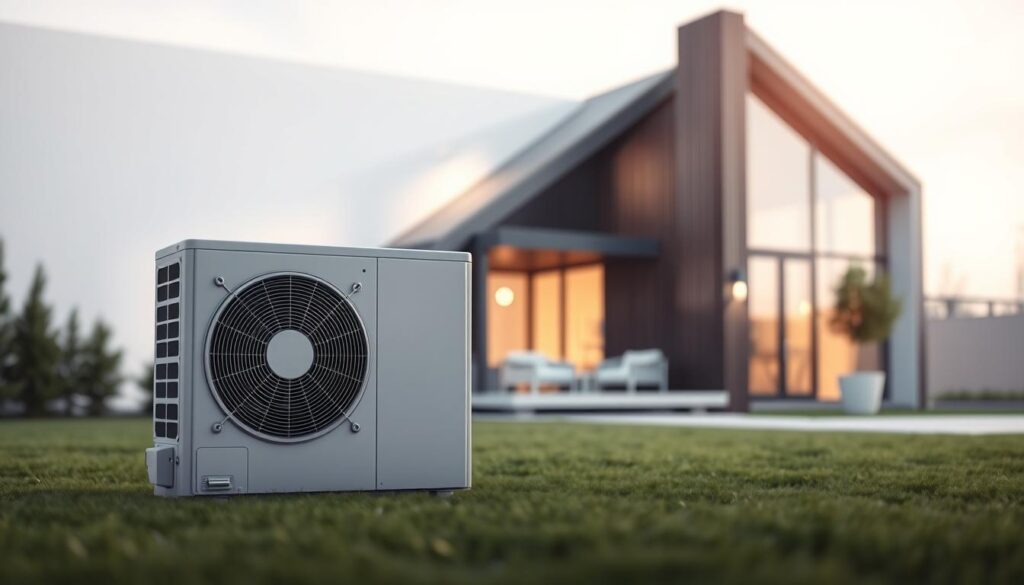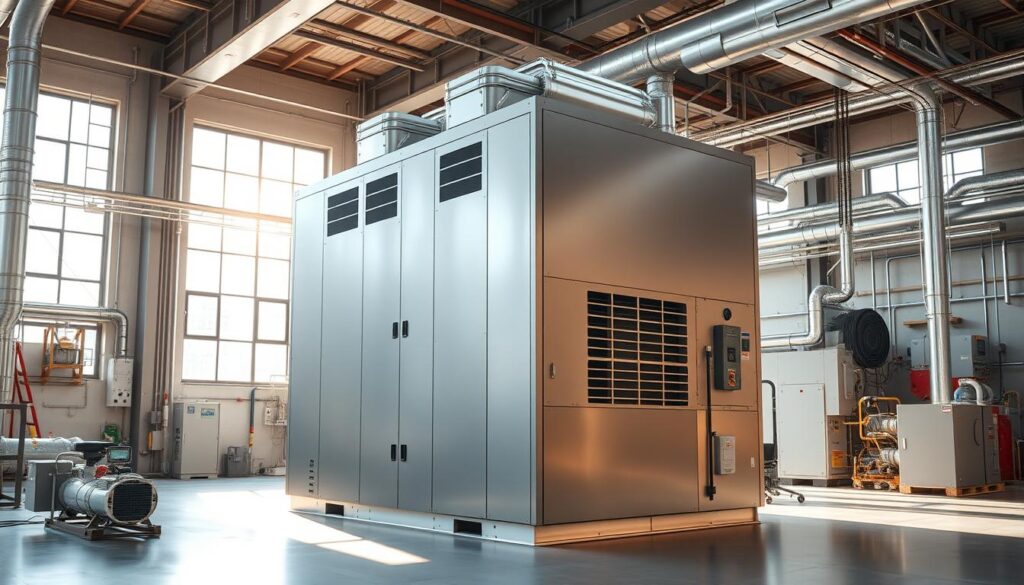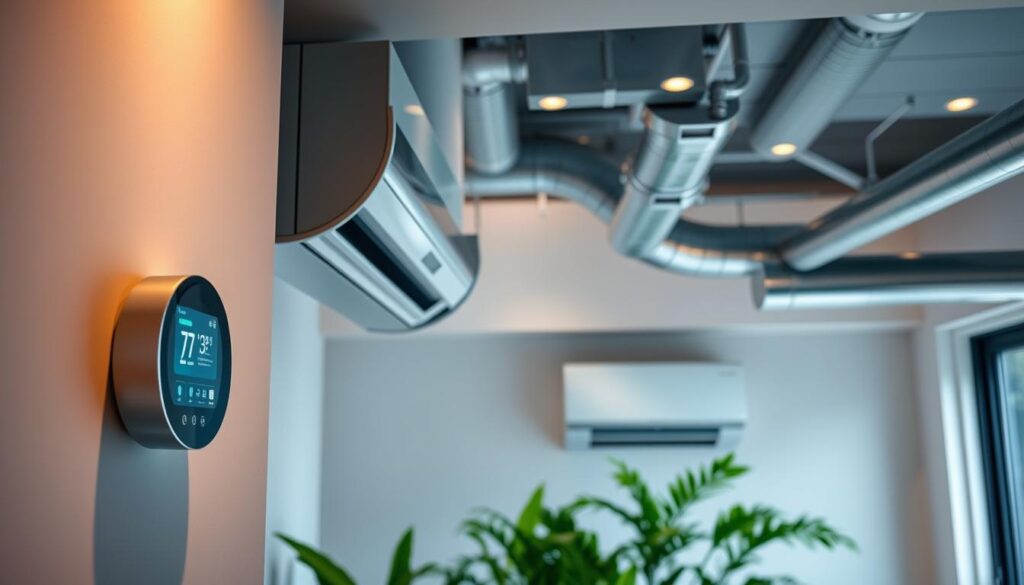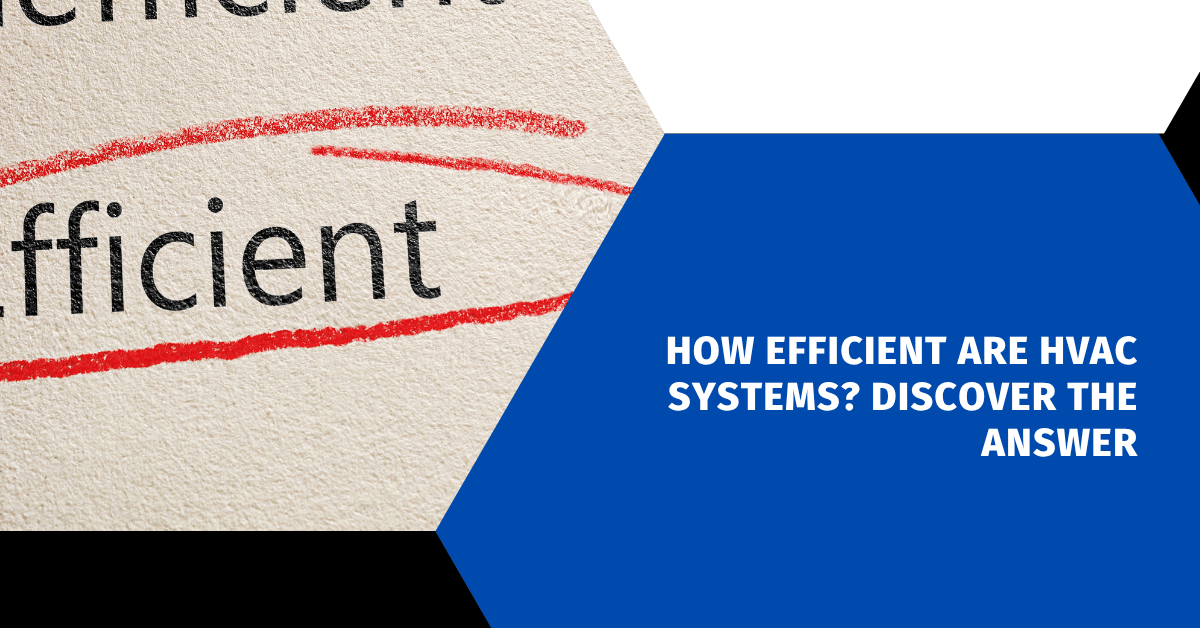Affiliate Disclosure
HVAC Guide Guys is a participant in the Amazon Services LLC Associates Program, an affiliate advertising program designed to provide a means for sites to earn advertising fees by advertising and linking to Amazon.
How Efficient Are HVAC Systems? Are you unknowingly wasting money on inefficient heating and cooling? Your home’s HVAC system might be using more energy than you think. Heating and cooling use about half of a typical home’s energy, making it key to save money and the environment.

Every year, three million heating and cooling systems are replaced in the U.S. This shows people are getting smarter about controlling their home’s climate. Homeowners want to cut down on energy use and lower bills with better HVAC tech.
Today’s HVAC systems can greatly improve your home’s energy use. By choosing high-efficiency equipment, you could cut energy use by up to 50% for electric systems and 10% for gas furnaces.
Key Takeaways
- HVAC systems consume approximately half of home energy usage
- Three million HVAC systems are replaced annually in the U.S.
- High-efficiency equipment can dramatically reduce energy consumption
- ENERGY STAR certified systems can save 10-30% on annual energy bills
- Professional assessment is key for the best HVAC efficiency
Table of Contents
Understanding HVAC System Basics and Energy Consumption
Your home’s comfort relies on a complex network of heating, ventilation, and air conditioning (HVAC) systems. Knowing how these systems work can help you improve their performance and cut down on energy use.
Modern HVAC systems are complex machines. They keep your home at the right temperature while using less energy. Let’s look at the main parts and how they use energy.
Core Components of HVAC Systems
- Heating Unit: Generates warmth during cold seasons
- Cooling Unit: Provides relief during hot weather
- Ventilation System: Circulates and filters indoor air
- Thermostat: Controls temperature and energy usage
Energy Consumption Insights
HVAC systems use a lot of household energy. They account for 35% of total energy use. This makes it important to be efficient for the planet and your wallet.
| HVAC Efficiency Metric | Performance Impact |
|---|---|
| SEER Rating | Up to 23% improved cooling efficiency |
| AFUE Rating | 90% energy conversion to heat |
| Smart Thermostat | 10-15% annual energy savings |
Impact on Utility Bills
Your HVAC system’s efficiency affects your monthly bills. Energy-efficient systems can cut consumption by up to 30%. This means big savings over time.
“Investing in HVAC efficiency is not an expense, but a strategic financial decision.” – Energy Expert
By grasping these basics, you can make smart choices about your home’s heating and cooling. This will boost comfort and lower energy costs.
Explore Our HVAC Shop
Looking for top-rated HVAC tools, parts, and accessories? Visit our shop and find the perfect solution for your needs.
Visit the ShopHow Efficient Are HVAC Systems: A Comprehensive Analysis
Your HVAC system is key to your home’s energy use. Knowing its efficiency helps you make better choices to save energy and cut costs.
Today’s HVAC tech has changed how we use energy. Switching to efficient systems can cut your home’s energy use a lot. Here are some important points about saving energy with HVAC:
- Up to 50% energy reduction with electric heating/cooling upgrades
- 10% possible savings for gas furnace heating systems
- Energy Star-rated systems can lower energy use by 15%
Now, let’s look at the main efficiency metrics for HVAC systems:
| Efficiency Factor | Potential Energy Savings |
|---|---|
| Proper System Sizing | Up to 20% improved efficiency |
| Regular Filter Maintenance | 5-15% efficiency improvement |
| Programmable Thermostats | 10-30% heating/cooling cost reduction |
Investing in high-efficiency HVAC technology is not just about immediate savings—it’s a long-term strategy for reducing energy consumption and environmental impact.
“Efficiency is doing better what is already being done.” – Peter Drucker
Your HVAC system works for 10-15 years. By focusing on efficiency and regular upkeep, you can boost performance and cut energy waste.
Explore Our HVAC Shop
Looking for top-rated HVAC tools, parts, and accessories? Visit our shop and find the perfect solution for your needs.
Visit the ShopMeasuring HVAC Efficiency: SEER and AFUE Ratings
Knowing how your HVAC system works is just the start. To really get the most out of it, you need to understand SEER and AFUE ratings. These are key to making your system work better.
When you’re looking for a new HVAC system, you’ll see two important ratings. They help you figure out how energy-efficient it is:
- SEER (Seasonal Energy Efficiency Ratio) for cooling systems
- AFUE (Annual Fuel Utilization Efficiency) for heating systems
Understanding SEER Ratings for Cooling Systems
SEER ratings go from 13 to 25. The higher the number, the more energy-efficient it is. An 18 SEER system can save you about 27% on cooling costs compared to a 13 SEER system.
AFUE Ratings for Heating Performance
AFUE shows how well your heating system uses fuel. Most homes have systems between 80% and 95% efficient.
| AFUE Rating | Efficiency Level | Energy Savings |
|---|---|---|
| 80% | Standard Efficiency | Basic Performance |
| 90-95% | High Efficiency | Up to 50% on Utility Bills |
What These Ratings Mean for Your Home
Choosing a system with high SEER and AFUE ratings can cut down your energy use.
“Investing in an efficient HVAC system is not just about saving money, but also about reducing your environmental footprint”
Even though high-efficiency systems might cost more at first, they save you money in the long run. Plus, they make your home more comfortable.
High-Efficiency HVAC Systems and Their Benefits

Upgrading to high-efficiency HVAC systems can change your home’s comfort and energy use. These systems are a big step up in heating and cooling tech. They help homeowners cut down on energy bills and environmental harm.
Modern high-efficiency HVAC systems have cool features that make them stand out:
- SEER ratings between 15-25, showing top energy performance
- Smart thermostat integration for exact temperature control
- Variable-speed compressors that save energy
- Less noise during use
Choosing high-efficiency hvac systems is more than buying equipment. It’s a smart choice for saving on hvac energy. ENERGY STAR certified systems can cut your yearly energy bills by 10-30%. This saves money over time.
“Efficiency is doing better what is already being done.” – Peter Drucker
These systems do more than save energy. They also improve indoor air quality, keep temperatures steady, and cut down on carbon emissions. Getting them installed by pros helps you get the most out of these advanced HVAC solutions.
Homeowners gain many benefits from high-efficiency systems:
- Lower monthly utility costs
- Better home comfort
- Higher property value
- Less environmental harm
By picking a high-efficiency HVAC system, you’re investing in both comfort now and sustainability for your home later.
Factors Affecting HVAC System Performance
Your HVAC system’s efficiency depends on many factors, not just buying good equipment. Knowing these can help you get the most out of your system.
Good HVAC performance needs careful thought on several key points. These points affect how well your system works and how much energy it uses.
Installation Quality Impact
Bad installation can really hurt your system’s performance. Studies show that wrong installation can make energy use go up by 30%. Important installation steps include:
- Precise equipment sizing
- Correct ductwork configuration
- Proper sealing of connections
- Appropriate refrigerant charge
Maintenance Requirements
Regular maintenance is key to keeping your HVAC system running well. Skipping annual checks can cause:
- More energy use
- Shorter system life
- Higher repair bills
- Worse indoor air quality
“A well-maintained HVAC system can save up to 20% on annual energy costs.”
Environmental Considerations
Things outside your home also affect your HVAC system. Important environmental factors include:
- Climate conditions
- Home insulation quality
- Ductwork integrity
- Building orientation
Knowing these factors helps homeowners make smart choices for their HVAC systems. This ensures they work well and use less energy.
Explore Our HVAC Shop
Looking for top-rated HVAC tools, parts, and accessories? Visit our shop and find the perfect solution for your needs.
Visit the ShopEnergy Saving Features in Modern HVAC Technology

The world of energy-saving HVAC tech is changing fast. It brings new ways for homeowners to cut down on energy use and lower their bills. Today’s HVAC systems come with top-notch features that make them much more energy-efficient.
These new ideas are changing how we control our home’s climate:
- Smart thermostats that adjust temperatures better
- Variable-speed compressors that use less energy
- Advanced zoning systems for better cooling and heating
- Heat recovery ventilators that boost system performance
Here are some amazing efficiency stats:
| Technology | Energy Savings |
|---|---|
| Smart Thermostats | 10-15% less cost each year |
| Variable Speed Compressors | 20-40% less energy needed |
| High-Efficiency Heat Pumps | 50% less energy than old systems |
New tech like IoT systems and better filters are changing home climate control.
“The future of HVAC is not just about cooling or heating, but about intelligent, energy-conscious solutions.” – HVAC Industry Expert
Choosing these advanced technologies can change your home’s energy use. It can save you a lot of money over time and help the environment too.
Cost Analysis: Energy Efficiency vs. Operating Expenses
Thinking about upgrading your HVAC system? It’s important to know the costs involved. Investing in energy-efficient tech can save you a lot of money in the long run. What might seem expensive at first can actually be a wise choice.
Initial Investment Considerations
Energy-efficient HVAC systems cost more upfront. Prices vary, but the savings make it worth it. You might spend $5,000 to $15,000, depending on your home’s size and system needs.
- High-efficiency models typically cost 10-30% more than standard systems
- Advanced technologies increase initial pricing
- Quality installation impacts overall investment
Long-term Savings
Upgrading your HVAC system saves money over time. Energy-efficient models can cut your utility bills by 20-50%. This means big savings every year.
| Efficiency Level | Annual Savings | 20-Year Savings Projection |
|---|---|---|
| Standard Efficiency | $500 | $10,000 |
| High Efficiency | $1,250 | $25,000 |
Return on Investment Timeline
The time it takes to see your money back is usually 3 to 7 years. This depends on local energy prices, climate, and how much you use your system.
“Investing in energy efficiency is not an expense, but a strategic financial decision.” – Energy Efficiency Expert
Tax breaks and rebates can also lower your costs. You might save 10-30% on installation. By looking at these factors, you can make a choice that saves you money and helps the planet.
Explore Our HVAC Shop
Looking for top-rated HVAC tools, parts, and accessories? Visit our shop and find the perfect solution for your needs.
Visit the ShopTips for Optimizing Your HVAC System’s Efficiency
Homeowners can save money and feel more comfortable by improving their HVAC system’s performance. Your HVAC system is a big investment. Making it work better can save you money and make your home more comfortable.
Here are some important ways to make your HVAC system better:
- Replace air filters every month to keep air flowing well and your system running efficiently
- Get professional maintenance in the spring and fall
- Seal and insulate your ducts to stop air from leaking out
- Use a smart thermostat to control the temperature smartly
- Make sure your HVAC system is the right size for your home
Using these tips can really help. Did you know that regular maintenance can make your HVAC system up to 20% more efficient? Taking care of your system means it works better and uses less energy.
“An efficiently maintained HVAC system is like a well-tuned engine – it performs better, costs less to operate, and lasts longer.”
Smart homeowners take care of their HVAC systems. By focusing on making your system better, you can save about $140 a year on energy bills. Simple steps like cleaning filters, checking refrigerant, and insulating well can greatly improve your system’s performance.
Here are more ways to make your HVAC system better:
- Use ceiling fans to help air move around
- Keep the thermostat setting the same
- Keep outdoor units clean of debris
- Find and seal any air leaks in your home
By keeping up with maintenance and making smart changes, you’ll save on energy and make your system last longer.
Conclusion
Learning about HVAC systems can change how you think about home comfort and energy use. High-efficiency HVAC tech can cut your bills by 30% to 50% compared to old systems. You might see savings right away, and most people get their money back in 3 to 5 years.
Boosting HVAC efficiency does more than save money. It makes your home better to live in. New systems can filter out up to 90% of bad air particles, making your air cleaner. They also last longer, up to 5 to 10 years more than old systems.
Adding an energy-efficient HVAC can raise your home’s value by 5% to 20%. Choosing the right size and using smart tech like variable-speed motors helps save energy. It’s about finding a balance between upfront costs and long-term benefits.
When picking an HVAC, think of it as an investment in your home’s comfort, greenness, and value. Look at your current system, check out new tech, and choose wisely. It’s good for your wallet and the planet.

